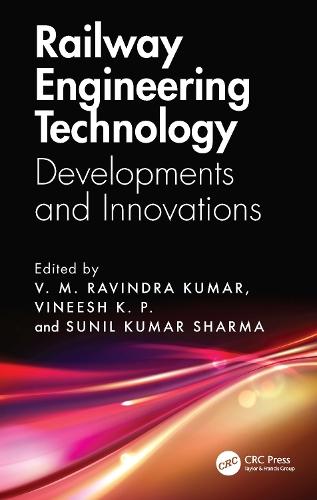Overview
This book presents advances in railway engineering, including railway wheels, wheel failure mechanisms, innovations in railway track designs, and axle failures. It covers rail–wheel traction characteristics under various environmental conditions for full-scale test conditions, including braking systems. It provides an understanding of the applications of digital twin technology in railway systems, predictive maintenance, performance optimization, and overall system efficiency. It also emphasizes sustainable practices, energy-efficient technologies, and environmental impact assessments. Features: Comprehensively reviews various aspects of railway engineering technology. Discusses major failure mechanisms and various types of braking systems. Covers the modernization of railways and high-speed trains. Explores emerging topics such as digital twin technology, sustainable practices, and autonomous technologies. Includes case studies of railway component failures and accidents. This book is aimed at researchers and professionals in railway and mechanical engineering as well as transportation systems.
Full Product Details
Author: V. M. Ravindra Kumar (VIT-AP Uni, Andhra Pradesh) ,
K. P. Vineesh (NIT Calicut, Kerala) ,
Sunil Kumar Sharma (Inst. Railway Vehicles and Railway Tech, Germany)
Publisher: Taylor & Francis Ltd
Imprint: CRC Press
Weight: 0.790kg
ISBN: 9781032836508
ISBN 10: 1032836504
Pages: 328
Publication Date: 30 September 2025
Audience:
College/higher education
,
Professional and scholarly
,
Tertiary & Higher Education
,
Professional & Vocational
Format: Hardback
Publisher's Status: Forthcoming
Availability: Not yet available

This item is yet to be released. You can pre-order this item and we will dispatch it to you upon its release.
Author Information
V. M. Ravindra Kumar is a faculty member at the School of Mechanical Engineering at VIT-AP University. He received a Ph.D. from the Indian Institute of Technology, Kharagpur. He worked on a major railway engineering problem, “Locomotive Wheel Failure from Excessive Wheel Gauge Change,” and successfully identified the root causes of the problem. His research areas include railway engineering, numerical modeling of manufacturing processes, 3D and 4D printing. He has published research articles in various national and international journals and contributed to book and book chapters. He has the experience of working in sponsored research projects. K. P. Vineesh is a faculty member in the Department of Mechanical Engineering at the National Institute of Technology Calicut. He has 8 years of experience in teaching, research, and academic administration. He obtained his Ph.D. from the Indian Institute of Technology Kharagpur. His major research areas are railway engineering, machine design, metal additive manufacturing, and vehicle dynamics. He has several peer-reviewed international journals in his core research areas and holds two patents. Sunil Kumar Sharma is a Professor and Chair of Rail Vehicle Technology at the Institute of Railway Vehicles and Railway Technology, Technische Universität Dresden, Germany, and an Assistant Professor at Gati Shakti Vishwavidyalaya, Vadodara, a Central University established by the Ministry of Railways, Government of India. He received his Ph.D. from the Indian Institute of Technology, Roorkee. He has worked at the Non-destructive Evaluation and Structural Health Monitoring Laboratory at C.N. University, South Korea. His research interests include vehicle dynamics, contact mechanics, mechatronics, and real-time software-enabled control systems for high-speed rail vehicles. He has published several research articles in national and international journals, contributed to book chapters, and edited a book. He is among the top 2% of scientists in a global list compiled by Stanford University, USA.



